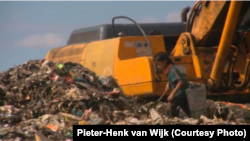Mae Sot is a city in Western Thailand that is close to the border with Myanmar, also known as Burma. Just a 15-minute drive from its center is a garbage dump that is also home to 300 refugees from Myanmar. A documentary called Illegal Immigrants on the Mae Sot Garbage Dump shows how 100 families who have fled conflict at home have found refuge there and manage to survive in appalling conditions.
Men, women, and children dig through mountains of trash to earn money by collecting plastic and glass bottles for recycling. They must rely on the kindness of volunteers who supply them with food and medical needs. Fred Stockwell, from Oregon, is one such dedicated volunteer. He provides help to those living in the dump, and gets up close and personal while doing so. In the documentary, he is shown delivering two hundred blankets and taking a child suffering from constant nosebleeds to the Mae Tow clinic, where free health care is provided to the refugees.
Despite the hardships, the illegal squatters are shown to entertain themselves by ingeniously rigging up a makeshift movie theatre, using an electric generator, a television screen, and giant speakers. It is used to play DVDs, particularly for the children on weekends. But hovering ominously over all of those living at the Mae Sot dump is the fear of arrest and being sent back to Myanmar. Thai police periodically raid and demolish their tents and what few possessions they have. Many flee back to an uncertain future in Myanmar. Some residents stay behind, hoping to be left alone.
Pieter-Henk van Wijk directed Illegal Immigrants on the Mae Sot Garbage Dump as a graduation project for school. Van Wijk is based at The Hague, in the Netherlands, and uses a cinema verité style to present a true life story that demands attention. VOA’s Ray Kouguell spoke with van Wijk about the humanitarian crisis he witnessed and what led to his getting involved.
VAN WIJK: It was an assignment for my previous graduation project from school and I was wondering about the country Burma because at the time it was not really known. And then I read about it, that it had a lot of child soldiers and a lot of problems. And then I got more interested and then I decided to go over there to the border on Thailand to get to know more about the conflict.
KOUGUELL: What kind of access did you have to film at the garbage dump?
VAN WIJK: I went there with Fred Stockwell, he was volunteering there for a few months, and first I just went with him to bring over some food and medicine and after that when we got to know each other more, I took out sometimes my camera and they didn’t mind me filming over there.
KOUGUELL: What kind of health problems are the people exposed to there?
VAN WIJK: It’s not a very clean environment. When we brought a doctor over and the kids sometimes had nutrition problems a little bit, like they were a little bit sick. Once I brought a woman to the Mae Tow clinic because she was pregnant.
KOUGUELL: Where would you go at the end of the day?
VAN WIJK: I slept in, how do you say, a small hotel nearby or a hostel and I slept a few days on the dump when the police did a raid.
KOUGUELL: How did the immigrants there find anything to eat?
VAN WIJK: They worked for money because they recycle plastic and the glass on the dump and they work in shifts and they bring it to the recycle center and they get money.
KOUGUELL: Do you think there are any realistic hopes for families living in that environment?
VAN WIJK: I noticed the children were always happy and playing and I guess also the way they worked it was really structured. They worked in shifts and when we got there and when we gave out blankets it was like very organized and we didn’t have to do anything about it to make it run smooth. I guess the way they were living over there, I had some respect for that.
KOUGUELL: Why did the children at the Mae Sot garbage dump seem so resilient and well adjusted?
VAN WIJK: They just played and of course there more people came over to the dump sometimes to bring stuff. And they also had like a cinema theatre but then the police went over there and they raided everything. Before that they had like a cinema night and they could pay a few cents also to have entertainment.
KOUGUELL: From your experience doing this film, why do you think there isn’t more international outrage over the situation?
VAN WIJK: That’s hard to say, because sometimes I guess in Thailand their immigrants are not treated very [well]. And sometimes it comes in the newspapers but not that often.
KOUGUELL: Is there any reaction to the film that’s resulted in improving or changing the situation?
VAN WIJK: Yeah definitely. I got quite some emails from people who wanted to help or donate stuff.
KOUGUELL: How serious is the illegal immigrant problem in Mae Sot for those fleeing Myanmar?
VAN WIJK: I guess quite bad because they are illegal of course in Thailand so they’re really afraid of being sent back so they’re kind of hiding and I guess that’s why they don’t get paid enough or get treated very harshly.
KOUGUELL: Van Wijk’s documentary puts the spotlight on an inhumane situation that’s not gone away. Illegal Immigrants on the Mae Sot Garbage Dump profiles just one of many horrendous refugee stories around the world. Seeing people climbing over trash and charging towards a truck off-loading even more of it is gut wrenching. This film is a call to action for yet another part of the world’s impoverished, so often through no fault of their own.





